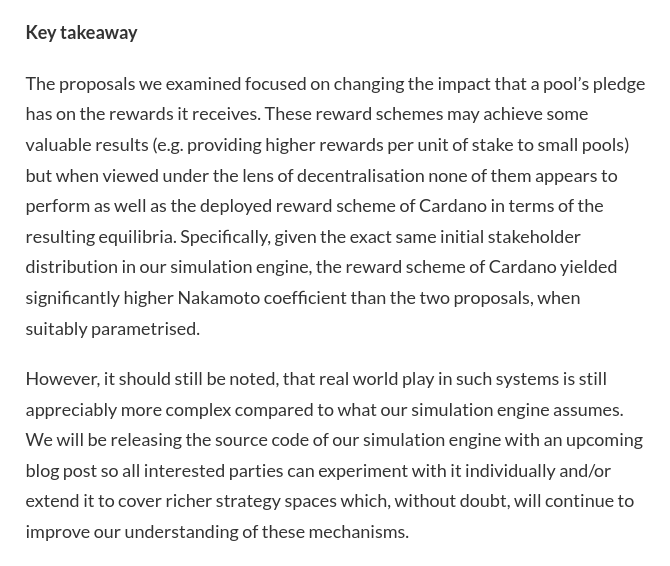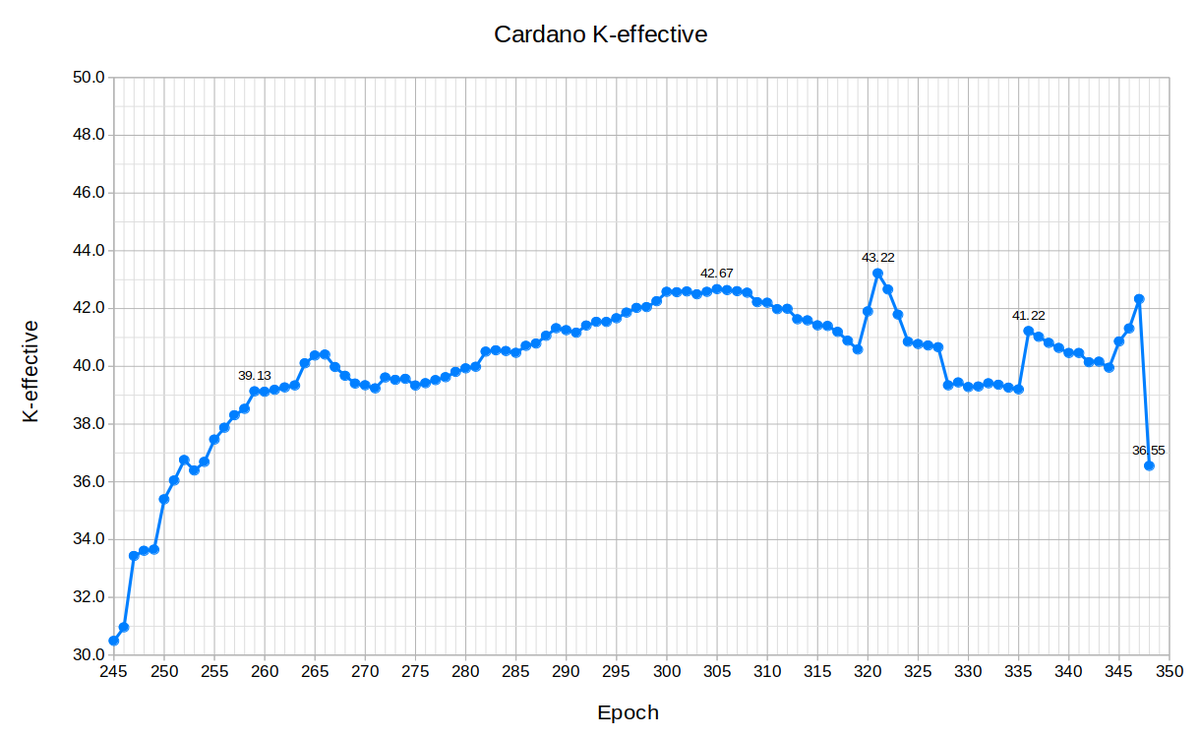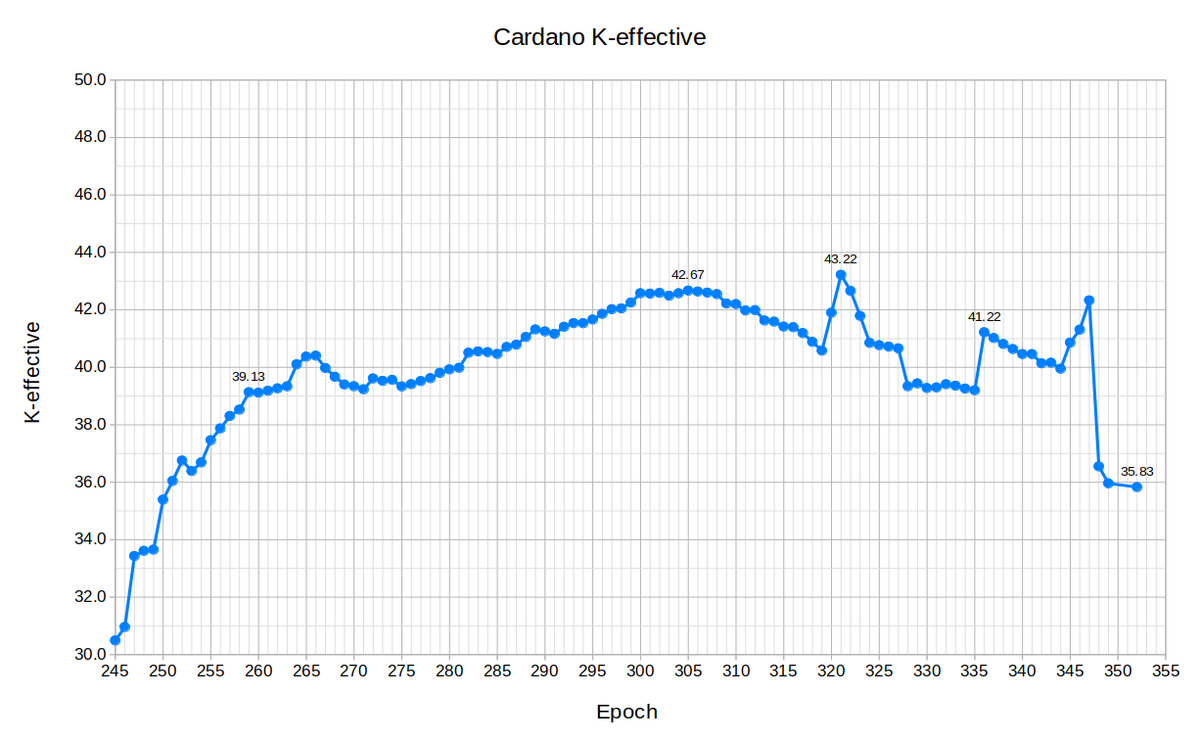IOHK examined @shawn_mcmurdo's Curve Pledge Benefit & @DrLiesenfelt's CIP 50 alternative #Cardano reward schemes.
They conclude that "none of them appears to perform as well as the deployed reward scheme of Cardano in terms of the resulting equilibria".
blogs.ed.ac.uk/blockchain/202…

CIP-50 is the process for decentralizing the analysis, governance, values, and principles of the Cardano reward equation. These are just the beginning steps to growing a robust hivemind.
Join the discussion on the CIP-Editors Discord: discord.gg/Q3WuMPMk9A
I think we have a narrow window in which we can push CIP-50 and other such multi-pool adjustments for Cardano before it becomes impossible.
In the not-so-distant future, celebrities/corporations will come here, set up permanent multi-stakepools, and push out every existing SPO.

Is @InputOutputHK / @sol3gga gonna go with the “let’s continue to do nothing” approach?
Did the engine foresee where we are today? If it did, why did we still follow this path? If it didn’t, then why would we trust it’s conclusion this time?
#cardano #hosky @DrLiesenfelt #cip50
I was sad to see the MSPO vs sSPO conflict and a biased reward equation when I joined Cardano in February. CIP-50 and k-effective exist to heal this divide, align value & principles, and correct the true problems: excessive leverage, inequality, and decentralization.

I've collected some of the concerns of CIP-50 and put it in a thread. I don't see it discussed as much as the positives, but I think it's just as important to get it out there so we can build the strongest network we can.
#Cardano #CardanoCommunity #CIP50
Consider supporting CIP-50 that aims to give similar ada returns for delegators to small, medium and large pools. @DrLiesenfelt the initial author of CIP-50 is seeking input. github.com/cardano-founda…
Not a good look at all! 🙁
Come on #CardanoCommunity - Please support single pool operations 🙏
As we have mentioned before... LEAD supports CIP-50 🙌
Thank you @DrLiesenfelt for your work and analysis 🙇♂️
#Cardano #ADA $ADA
#Cardano @EpochsEnd 349:
Decentralization is not improving. 🫤
Coinbase is up to 2.1B and making blocks again.
K-effective = 36.55
Nakamoto Coefficient MAV = 22

Yes, I'm already planning far more than the original paper in code transparently on GitHub. The original paper lacked multipool actors, an equation & parameter competition, large populations with entropy, MAV, k-effective, and Sybil fractions. CIP-50 has a section on validation.
Would you be able to explain 'like to a 5 yr old' why CIP 50 is good? I read full proposal but some of it is over my head. You list some smart people who agree w/ it & some that don't. Why might those who don't, not? Have any others you've asked to review, done so yet? TYIA!
By Epoch 245 MAV fell from ~35 to ~13 and IOG likely had to abandon hopes their equation could achieve k=500, MAV=~250. They just were hoping it didn't drop more into the BTC / ETH realm. CIP-50 fixes the current equation and aligns values to the principles of Cardano.
CIP-50 is a stakeholder/community hivemind effort to avoid another centralized groupthink peer reviewed mistake. There is money, egos, power, control, and fear involved in the now stagnant decentralization.
Reasons I've seen from community discussions why people disagree with CIP-50,
🧵1/6
- CIP50 will create low pool saturation making "oversaturation attacks" easy (10mil ada whale stakes to pool with 5mil saturation -> real delegators leave. Has happened multiple times already.)
One of my biggest disappointments with IOG is that they have yet to give a proper response to what their issues are with CIP50. If their models show that it's a flawed solution, they at least owe the community an explanation on why that's the case.
Have you guys checked out CIP-50? It could help out small pools even more, without big pools taking a hit. Highly recommended read.
Comparison of alternative reward schemes for Cardano
Key takeaway
The proposals we examined focused on changing the impact that a pool’s pledge has on the rewards it receives. These reward schemes may achieve some valuable results (e.g. providing higher rewards per unit of stake to small pools) but when viewed under the lens of decentralisation none of them appears to perform as well as the deployed reward scheme of Cardano in terms of the resulting equilibria. Specifically, given the exact same initial stakeholder distribution in our simulation engine, the reward scheme of Cardano yielded significantly higher Nakamoto coefficient than the two proposals, when suitably parametrised.
However, it should still be noted, that real world play in such systems is still appreciably more complex compared to what our simulation engine assumes. We will be releasing the source code of our simulation engine with an upcoming blog post so all interested parties can experiment with it individually and/or extend it to cover richer strategy spaces which, without doubt, will continue to improve our understanding of these mechanisms.
I agree with just about everything you say. And I appreciate you saying it!
That said, have you had the opportunity to look @DrLiesenfelt 's CIP - 50 and the concerns he is addressing with it?
There are aspects to the protocol's long-term decentralization/Voltaire era that nd wrk
Note that "the min cost parameter is not part of the original reward sharing scheme [...] We should emphasize that our results are for the original reward scheme without the min cost parameter."
Which might be another argument to get it removed or decreased as proposed recently.

This was a timely release,
@adatainment @_KtorZ_ one of my issues with the CIP process has been that a CIP could find strong community support and still easily be ignored by the entities that assume authority to implement them. glad to see the squeaky wheel get the grease.
I hear you, and unfortunately, this isn't a problem of the CIP process itself. I think everyone is well aware of the current centralized nature of the development of Cardano and CIPs are one tool that can help remedy to that. They are part of the solution, not the problem.
While I hear you Chris, still CIP should be seen more as a platform for discussion. A way to agree on something. And that usually takes time. I think just because something has/seems to have great support doesn't automatically make it good. (unrelated to the CIP by Michael)
I get the impression that IOG thinks Cardano is decentralized enough and doesn't really care about improving it. Took them months just to look at CIP-50 only to say under their simulations it's not as good.
Damn, K-effective dropped significantly lately. Trend is looking bad :/
Do @InputOutputHK or @CardanoStiftung have at least expressed any interest about CIP-50 or they are overall satisfied about current incentives scheme and its present effect on #Cardano decentralization?
#Cardano @EpochsEnd 353:
K-effective = 35.83, MAV = 21
CIP-50 Update:
Reformatting all charts. Adding pool ranking recommendation (@TheStophe). A new OSS simulation suite will investigate 5-10 equations for an independent study & paper. The hivemind grows.

Cardano as a network will become uninvestable if it centralizes too much
After looking at the mounting critiques, I no longer think CIP-50 is the way forward, but something needs to happen
MPOs will kill the network by slowly transforming it into an expensive Excel Spreadsheet

Cardano #research and #simulations say #parameter changes are not required at this time. Disclaimer: My personal interpretation only #Cardano #blockchain
After today's SPO call, I get the impression #decentralization is a key concern and research is happening, but the backlog of #VASIL is gonna take priority. I think the community cares a lot about this issue, so it won't be ignored.




























